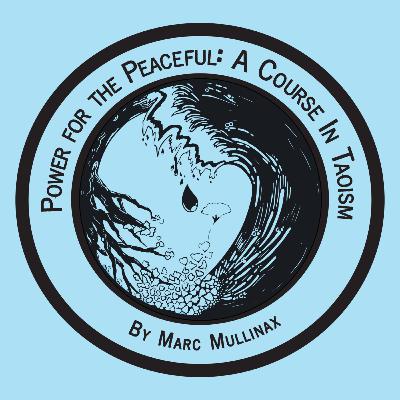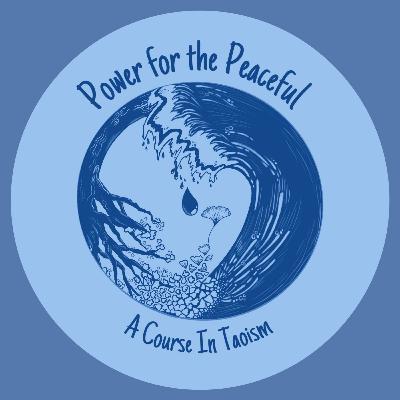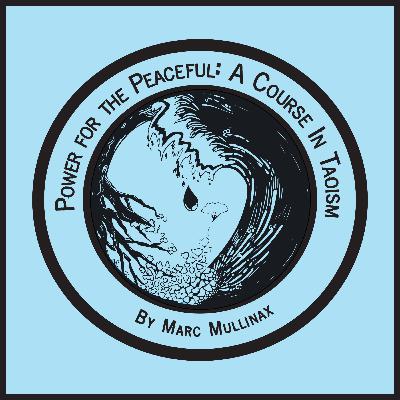Discover Power for the Peaceful: A Course in Tao
Power for the Peaceful: A Course in Tao

Power for the Peaceful: A Course in Tao
Author: Marc Mullinax
Subscribed: 48Played: 935Subscribe
Share
© Marc Mullinax
Description
What is Taoism/Daoism? "Power for the Peaceful" is an introductory course PLUS life-applications of the 81 verses of the Tao te Ching, a 2500 year-old Chinese text that has lost nothing of its power for peace today.
91 Episodes
Reverse
We pause every 10 verses to enrich and provide more info than one may find in Tao te Ching text itself. More history, more practices, more background.
This episode covers the kind of embarrassing dilemma we in the West have: Our 100+ versions of Tao te Ching in English are separated from Taoism as it has been generated and practiced by actual Taoists in Taoism's home: China.
Thus, this episode makes a plea for us to become more educated and conversant about an ENTIRE culture, history, and tradition that gave us this one sliver of Taoism - this Tao te Ching text. If you know only Tao te Ching but not Taoism itself as a living culture, this episode introduces Taoism's practices.
I make reference in the episode to (1) my "spiritual terrorism" blog, when Japan weaponized a Taoist practice (http://allkoreaconsidered.blogspot.com/2017/07/spiritual-terrorism.html) and (2) and to the Stanford Encyclopedia of Philosophy (https://plato.stanford.edu/entries/daoism-religion/)
May your days begin in peace, and become practices with which you weave radical hope, for you, and your communities.
Marc Mullinax - mmullinax@mhu.edu
This is an episode devoted to the all-important Verse #1 of Tao te Ching. Its very first out-of-the-block teaching is for us to rely on silence and awe, not words, to discern Tao.
Chad Holt is our quote reader and question-asker.
I welcome you to contact me at https://www.marcmullinax.com/.
May your days begin in peace, and become laboratories for radical hope!
This episode gives some background of the context in which Taoism emerged, and some of the claims, such as Tao being the first philosophical attempt at a "Theory of Everything."
This is a trailer for a new podcast on Taoism and Tao te Ching
Teaser 2 for Technicolor Dreamcoat of Religion - How Religion Gets MadeFor his next podclass, Marc Mullinax teams up with Chandler Schroeder to bring you a series of podclasses, the first of which is called "How Religion Gets Made," premiering on July 1, 2025, on...a. YouTube - maybe preferred if you like strong visuals. To sign up, click “The Technicolor Dreamcoat of Religion“ or (https:www.youtube.com@TechnicolorDreamcoatofReligion)andb. Apple and Spotify podcast platforms. Just search for "The Technicolor Dreamcoat of Religion"Contact the show hosts at mmullinax@mhu.edu
Tao is another way of living, of thinking, of walking, ofwondering. It’s not new, for It’s always been with us. It’s “another” Way. In this last verse of the 81 verses of Tao te Ching, Eli Thompson joins me to give this podcast a great send off. We end with a discussion about the eight teachings of Tao that make “Tao still speak” for us today. Be sure to sign up for my new podclasses! Chandler Schroeder and I are beginning a new set of podcasts, on religion and how it, or they, get made. Don’t miss the preview trailer or these shows! Stay in touch by pressing “Subscribe” at “The Technicolor Dreamcoat of Religion“ where you can subscribe now for updates and our first semester of classes on how religions get made. (https://www.youtube.com/@TechnicolorDreamcoatofReligion)
Verse 80 is so counter-intuitive and counter-cultural today. Why travel, when ALL one needs is where one already is. It’s called “home.” While we can be like turtles or snails carrying our home around with us everywhere, we should first consider that we do not need to travel frenetically, to be home. This is a most radical teaching for a culture always on the move, where staying at home seems a life of boredom, where our collective motto isStar Trek’s mission: ‘to explore strange new worlds; to seek out new life and new civilizations; to boldly go where no man has gone before!‘ We mention an article by Rebecca Solnit. Chandler Schroeder and I are beginning a new set of podcasts, on religion and how it, or they, get made. Don’t miss thepreview trailer or these shows! Stay in touch by pressing “Subscribe” at “The Technicolor Dreamcoat of Religion“ where you can subscribe now for updates and our first semester of classes on how religions get made. (https://www.youtube.com/@TechnicolorDreamcoatofReligion)
Verse 79 is TTC’s main place where Lao Tzu frames “score-keeping” with “faith-keeping”. So in this verse we look at the various ways we injure ourselves (and our futures) with strict accounting of alleged slights we see someone giving us. The resentments build until one of two things happen: A complete breakdown of communication, or, the moment when someone stops practicing keeping-score and instead practices keeping-faith. We’re almost finished with this podcast. But please, keep your podcast feed open, for bonus episodes, announcements, and for questions that come up from the class. My email is mmullinax@mhu.edu. We have a new podclass about to begin: Chandler Schroeder and I are conspiring (which means to breathe together) on a new schedule of a series of related podcasts on religion, the ideas of religion, faith, and how the imagination fuels these. The pods we have begun to work on are based uponChandler’s career as a counselor, and my 30-year teaching career in New York City, Asheville, NC, and Seoul, Korea. We have already a YouTube channel called TheTechnicolor Dreamcoat of Religion“ where you can subscribe now for updates and our first semester of classes on howreligions get made. (https:www.youtube.com@TechnicolorDreamcoatofReligion)You can also keep this podcast feed - Power for the Peaceful - open, and you’ll get all the introductory updates.
Today’s episode was recorded outside in Fairview, NC, where the 17-year locusts are partying hard in the background. Verse 78 contains the third of only three instances of the word “water”. However, Water serves for Taoists through the centuries as THE single metaphor or model for Tao Itself. Act like water and you will live, refuse, get all brittle, and you’ll break upon the rocks. Water wears down mountains. Iterodes hard places, and makes the rough ways smooth. But especially, when acting like water, the tough become tender. Soft like water, they wear things away; and outlast every unnatural thing.Thanks to Teresa Aeschliman for her voice. The song Loveis the Water that Wears down the Rock is by Pat Wictor & Brother Sun, performed by Brian Graves, Jen Folkers, and Andy Barnett
Verse 77 this time. I call it ‘The Tao of Robin Hood,’ who was an equalizer of his (mythical) day, like Tao is all the time. In its yin-yang algorithm, ‘just enough’ is given to all, so no one lacks, and no one has more than enough. If another, ‘human tao’ interfereswith ‘Heaven’s Tao,’ then the yin-yang balance actually takes from those with too much, and gives to those with not enough.In this episode Marc confesses his love of Marx’s analytical power to understand big power issues (though he has no love for Marxism, or its actual practices in real time).We hear from lots of voices today: Thich Naht Hanh, The Buddha, Mick Jagger, Sun Tzu, and Herman Melville.
As we near the end of Tao te Ching’s 81 verses, we see Lao Tzu revisit some high themes we’ve seen before. Today’s verse 76treats how our grounding and rootage in the Way of Tao leads to a flexible, supple, resiliency, which leads to a longer or better life than one dedicated to grasping, getting hard-set and inflexible. In today’s podclass I provide some practices and ideas for living softly and nimbly, as well as reminder of those practices and ideas that we “can” practice that leads only hardening of life’s categories, to brittleness and dryness, leading perhaps to small deaths even before our final death.Here’s our Mantra: “Soft at the center, strongin the flow.”Reminder! Along with Chandler Schroeder, I am beginning a new series of podcasts called “TheTechnicolor Dreamcoat of Religion“ to which you can subscribe now for updates and our first semester of classes on how religions get made. (https://www.youtube.com/@TechnicolorDreamcoatofReligion)
Verse 75 recapitulates some themes we havealready seen in Tao Te Ching. Today we focus on how these themes are not Lao Tzu’s alone, but have wide and universal appreciation throughout the world’s spiritual traditions, philosophies, psychologies, and artistic endeavors. Thiswas so fun for me, and I hope you enjoy it, too. May your days begin with unclenched and empty hands, to become the sources for peace and hope in your world today.
As we near the end of Tao te Ching’s 81 verses, we see Lao Tzu revisit some high themes we’ve seen before. Today’s verse 74 treats how our prior grounding and rootage in Tao is ever and always stronger than culture’s siren calls to pay attention to the worthless, lifeless dreads and find of thinking. We hear from Paul Coelho, Abraham Lincoln, Cornel West, and the book of Ecclesiastes. Reminder! Along with Chandler Schroeder, I am beginning a new series of podcasts called “The Technicolor Dreamcoat of Religion“ to which you can subscribe now for updates and our first semester of classes on how religions get made. (https://www.youtube.com/@TechnicolorDreamcoatofReligion)
Verse 73 has a unique take and message for us looking for patterns in the universe to support our penchants for assigning “good” and “bad”, or “right” and “wrong” in advance as the universe unfolds around us.Instead, this verse might tempt us to flirt with becoming a student of the “Great Maybe” – a life where we let others make distinctions where there are none, while we return to the original uncarved block of existence where we find ourselvesoriginally defined by eternal Tao, and not by some temporary culture. We talk about theodicy, or the tendencies we have to offer predigested answers about why seemingly bad things happen. Reminder!Along with Chandler Schroeder, I am beginning a new series of podcasts called “The Technicolor Dreamcoat of Religion“ to which you can subscribe now for updates and our first semester of classes on how religions get made. (https://www.youtube.com/@TechnicolorDreamcoatofReligion)
Verse 72 has been translated several ways through the centuries. We look at these differing translations, and then focus on the power of fear to dampen our experience of Tao’s adjacent, fecund wisdom. We conclude that there is a “right fear” – such as fear of not preventing an injustice – that can influence us to act, and help us to overcome any inertia not to act.Reminder! Along with Chandler Schroeder, I am beginning a new series of podcasts called “The Technicolor Dreamcoat of Religion“ to which you can subscribe now for updates and our first semester of classes on how religions get made. (https://www.youtube.com/@TechnicolorDreamcoatofReligion)
Strongly-worded verse this time! Lao Tzu teaches about the subtle conspiracies of ignorance to dumb us down, weigh us down, & bring us down. But who anymore thinks of ignorance is an illness? Verse 71 teaches how Ignorance is not bliss; it is brutal, and can make us into the walking dead. How to work with or overcome ignorance? We offer several ways to deal with the silent killer disease of ignorance. If you want my collection of family- or kid-friendly Tao te Ching verses mentioned in this episode, use this email: marc.mullinax@gmail.com. Reminder! Along with Chandler Schroeder, I am beginning a new series of podcasts called “The Technicolor Dreamcoat of Religion“ to which you can subscribe now for updates and our first semester of classes on how religions get made.
What’sthe difference between knowing something, and understanding it? Maybe to know something is a mark of achievement and pride we saturate with our words, while to *understand* something or someone is a wordless condition, a state where we are VERY close to our original birthright status in Tao. I mention in the pod today a daily Buddhist wisdom email I urge you to subscribe to. Here is the link.Reminder! Along with Chandler Schroeder, I am beginning a new series of podcasts called “The Technicolor Dreamcoat of Religion” to which you can subscribe now for updates and our first semester of classes on how religions get made. (https://www.youtube.com/@TechnicolorDreamcoatofReligion)
Today, Verse 69. The centerpiece of today’s verse is captured in a story I tell about being in the presence of the late Archbishop Desmond Tutu. It’s a story that anyone who has an enemy may want to consider. Today’s awesome guest is Chad Smith, and his contact info is here: https://houseofmercyavl.com/connectReminder! Along with Chandler Schroeder, I am beginning a new series of podcasts called “The Technicolor Dreamcoat of Religion” to which you can subscribe now for updates and our first semester of classes on how religions get made. (https://www.youtube.com/@TechnicolorDreamcoatofReligion)
: This verse 68 is a work-out from verse 67’s three treasures: unconditional mercy, simplicity of wants, and humility. A personoperating from this strong triad of foundational virtues is not lured by the hell of violence, and encourages others to see the heavenly, peaceful way. Reminder! Along with Chander Schroeder, I ambeginning a new series of podcasts called “The Technicolor Dreamcoat of Religion” to which you can subscribe now for updates and our first semester of classes on how religions get made. (https://www.youtube.com/@TechnicolorDreamcoatofReligion)
Subscribe for the episodes when they come out at Please subscribe!! Stay in touch by pressing “Subscribe” at “The Technicolor Dreamcoat of Religion” where you can subscribe now for updates and our first semester of classes on how religions get made. (https://www.youtube.com/@TechnicolorDreamcoatofReligion)







